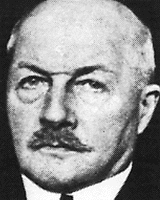<Back to Index>
- Philosopher Joseph Priestley, 1733
- Poet Giorgos Seferis (Geōrgios Seferiádēs), 1900
- President of the Swiss Federal Council Albert Meyer, 1870
PAGE SPONSOR

Albert Meyer (March 13, 1870 - October 22, 1953) was a Swiss politician, editor of Neue Zürcher Zeitung (1915 - 1930) and member of the Swiss Federal Council (1929 - 1938).
He was elected to the Swiss Federal Council on December 12, 1929 and handed over office on December 31, 1938. He was affiliated to the Free Democratic Party. During his time in office he held the Department of Home Affairs from 1930 to 1934 and the Department of Finance from 1934 to 1938 and was President of the Confederation in 1936.
22.10.1953 Zurich, prot., Fällanden and Zurich. Son of Johann Jakob, farmer, president of Municipal and member of the Grand Council. ∞ Elisabeth von Orelli 1900, daughter of Adolf Kaspar, forest district inspector, Zurich. He studied law and economics in Zurich, Berlin and Leipzig (Ph.D. in Zurich in 1895). In 1897 he became editor of the Economic NZZ and in 1915, editor. He
served on the Grand Council of Zurich (parliament, 1907 - 1927), the
National Council (1915 - 1929) and chaired the Swiss Radical Party
(1923 - 1929). He was a member of the Executive Board and trading Swiss National Bank (1927 - 1929). In
1929 he succeeded Robert Haab in the Federal Council: he was elected in
the fourth round against the official candidate of radical and
socialist Oskar
Emil Wettstein Klöti. After
leading the Department of the Interior, he resumed in 1934 and was the
finance chairman of the Confederation in 1936, its mandate broadly
coinciding with the global economic crisis. Defender
of the gold standard and a stable exchange rate, he was initially
hostile to the devaluation of the franc, but had to accept it in September
1936 after a majority decision of the Federal Council. The
attempt at a comprehensive reform of federal funding to replace the
interim measures which had succeeded since 1915 failed in June 1938
before the National Council, but the people in November 1938 approved
the interim solution developed by the Department of Finance. He resigned December 5, 1938. As a politician aware of his responsibilities, he was well regarded beyond party lines. He lived his last years in retirement marred by a serious illness. He had been also a Lieutenant - Colonel of Infantry.